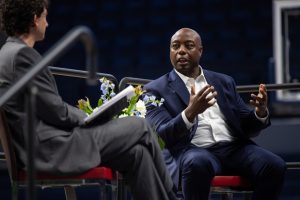
Ole Miss students, Capitol Hill staffers and Oxford residents gathered in the Sandy and John Black Pavilion on Friday, Oct. 27, to hear Republican presidential candidate and U.S. Sen. Tim Scott speak. UM’s Declaration of Independence Center for the Study of American Freedom hosted the event.
The South Carolinian spent the bulk of a 40-minute conversation with Steven Skultety, director of the Declaration Center, describing how Christian values and hard work have influenced his own life — and that these “universal truths” are at risk in America.
“I think we are seeing some of the greatest assaults on religious liberty that we’ve ever seen in the history of our country,” Scott said. “Without any question, we’re seeing it today around the world, but we’re seeing a lot of it at home as well. People want to challenge whether or not your faith should be a part of the public forum.”
Scott added that Christian faith and work ethic go hand-in-hand and that these values make America unique.
“They forget the fact that our founding fathers founded this nation upon the rock of Judeo-Christian ethos. It is that rock that allows this nation to be the city on the hill,” Scott said. “I’m not surprised that Americans, in some parts, are retreating from their faith, retreating from hard work, retreating from character, because embedded in our faith is this notion of hard work.”
The Declaration Center and its new minor in freedom studies were highlighted throughout the event. UM Chancellor Glenn Boyce praised the center in his opening speech.
“The mission of the Declaration Center is aligned with our university’s commitment to doing one thing that we do best here at the University of Mississippi: We build leaders,” Boyce said.
U.S. Sen. Roger Wicker, too, expressed his approval of the freedom studies minor.
“It is my hope that many graduates in this field of study will conclude that (America’s) unique founding principles are timeless, even essential. That’s why a center like this is so important,” Wicker said. “The fact that some people would think (the freedom studies minor) is controversial is a testimony to how important it is that we actually get this started.”
Scott spoke of the connection between capitalism and freedom, sharing his experience growing up in poverty.
“My first pursuit of freedom was freedom from poverty,” Scott said. “American capitalism, American free enterprise can work for a kid growing up in a single-parent household, mired in poverty, living in an inner city. It was another alternative to athletics to find economic freedom.”
He contended that government benefits hindered, rather than aided, his family’s economic situation.
“As a kid who grew up in poverty, the one thing that we always had was a government something, a government program, a government handout, a government subsidy,” Scott said. “And the only thing I could recognize as a result of all of that help — the government defines that as help — was please help us less. We don’t need that kind of help.”
Scott addressed his presidential campaign in a media conference held after the event. In recent polls, Scott is backed by only two percent of Republican voters — five percentage points behind former South Carolina Gov. Carolina Nikki Haley and 60 behind former President Donald Trump.
Scott remains optimistic.
“We’re in it to win it, so we’re in it for the long haul,” Scott said. “Hopefully better news comes next month as we continue to see momentum grow.”
He also called for the defunding of universities that allow pro-Palestinian demonstrations.
“For students who are advocating for mass murder, for students who are encouraging Jewish genocide and for folks who are supporting terrorism, those universities and colleges that cannot get their students in line, they should lose their federal funding,” Scott said.
Scott commended UM, saying that it adheres to America’s founding principles.
“One of the things I love about Ole Miss here is that we just had a conversation about the importance of freedom and liberty and the opportunity to see this university continue to flourish because they understand bedrock principles,” Scott said. “If that’s not the case on college campuses around this country, there should be severe consequences.”


























